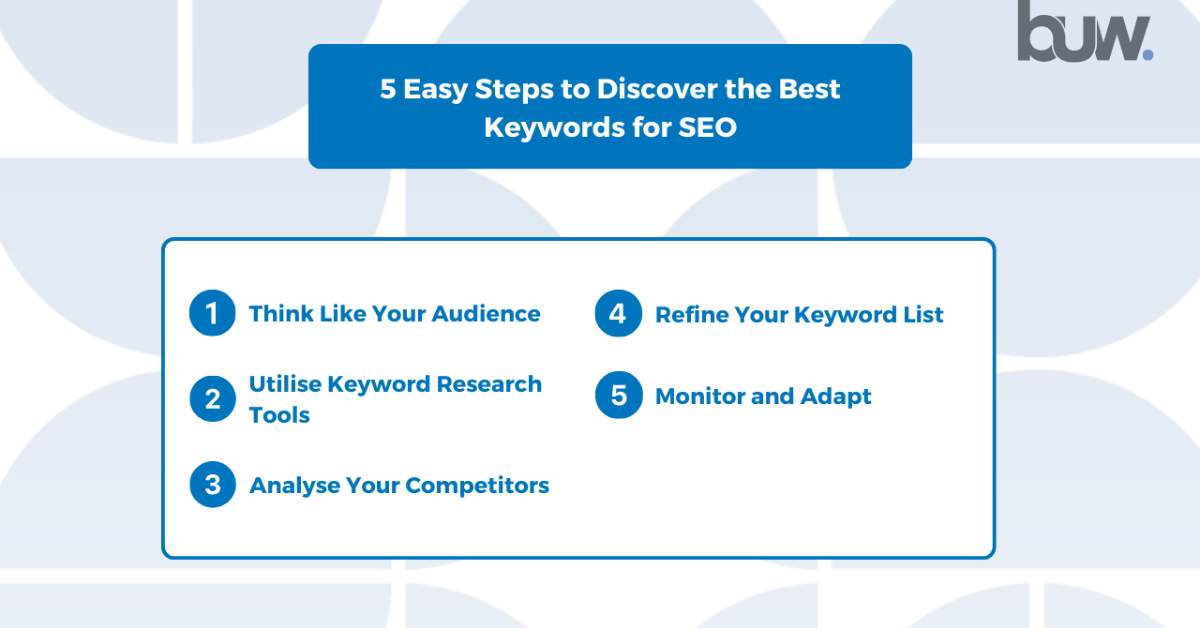Have you ever typed a question into Google, hit enter, and noticed that you’d landed on the exact page you needed?
That is the power of search engine optimisation (SEO) done right. But do you ever wonder how such websites manage to figure out what you’re looking for? Strategic keyword research holds the key to the solution.
Did you know that 93% of online experiences begin with a search engine? Thus, it should come as no surprise to learn that businesses are competing for top placement in search results for pertinent words.
But how can one choose the best keywords for their own SEO campaigns when there is so much data available?
This blog aims to break down the process into five easy steps so that you can quickly determine the keywords that will bring in targeted traffic.
5 Easy Steps to Discover the Best Keywords for SEO
Follow these 5 steps and see how you can crack the code to find the best keywords for SEO.

1. Think Like Your Audience
Take a moment to reflect on your ideal customer before diving into a keyword research tool. What are their wants, what bothers them, and what words do they use to try to find answers?
- Craft buyer personas: Develop comprehensive profiles outlining your ideal customer’s demographics, needs, and online behaviour. It helps in your comprehension of the terminology people employ when searching the internet.
- Pay attention to your audience: Use online reviews, social media listening tools, and customer feedback forms to learn more about the language those who are part of your target audience are using.
2. Utilise Keyword Research Tools
It’s time to make use of keyword research tools now that you have a better understanding of your audience’s viewpoint. These systems offer useful information on the volume of searches, degree of competition, and associated keywords. Popular choices include the following:
- Google Keyword Planner: A free resource from Google Ads providing information on search volume and degree of competition.
- Ahrefs: A well-known tool in the business that provides backlink monitoring, competitive analysis, and in-depth keyword research.
- Semrush: A powerful tool that includes on-page SEO audits, competitive analysis, and keyword research.
3. Analyse Your Competitors
You can learn a lot about your competitors’ keyword strategies by analysing them. To get started, find the top businesses in your industry and look at the content of their websites to see what keywords they rank for.
You can find areas of opportunity and gaps where you might be able to exceed them with this analysis. Examine their backlink profiles as well to see any possible keyword strategies they might be using to improve their SEO.
4. Refine Your Keyword List
Sort the first few items on your list by relevance, volume of searches, and competitiveness. Make high search volume and low-competition keywords your top priorities to increase your chances of ranking well.
When choosing keywords, take into account the intent of the user and use terms that are closely related to the information and services provided on your website. Effective organisation and targeting of keywords can also be facilitated by grouping them into clusters.
5. Monitor and Adapt
Since SEO is constantly changing, it is important that you monitor the effectiveness of your keywords. For your target keywords, monitor metrics like rankings, organic traffic, and conversion rates to determine how effective they are.
Keep up with algorithm modifications and industry developments to make sure your approach is current. Refine and adjust your keyword approach on a regular basis, depending on insights and performance, to stay competitive in the ever-changing SEO market.
Frequently Asked Questions (FAQs)
Let’s go over some frequently asked questions from executives about finding the best keywords for SEO.
Due to the possibility of increased awareness, high-volume keywords may appear desirable; yet, they are often more competitive, making it difficult to rank highly. To increase your chances of ranking well, it’s ideal to target a combination of high-volume and low-volume keywords, concentrating on those with a respectable search volume and little competition.
Although studying the keywords of your competitors might yield insightful information, you should concentrate on phrases that are relevant to your own value proposition. Adapt your approach to draw attention to your advantages and set yourself apart from competitors.
Despite having fewer searches, long-tail keywords can have higher conversion rates because of their specialised nature. By focusing on long-tail keywords, you may connect with specialised markets and draw customers farther into the purchasing process.
Conclusion
We hope that this blog has helped clarify the complex process of determining which keywords are ideal for SEO and has given you practical advice on how to improve your website’s exposure and search engine ranking.
You can maximise your online presence and harness the power of keywords by following this 5-step guide.
Are you prepared to up your SEO game? Book an appointment right now to discuss customised strategies and solutions that can improve your online visibility and help your business achieve real outcomes.
Latha Karthigaa, founder of Brandupwise (BUW) Marketing, is dedicated to improving lead generation for medium to large enterprises. Her strategic insights focus on lead generation, client acquisition, and most important of all educating the businesses and their internal teams about sustainable growth. As a transformative force in the industry, she reshapes the narrative of success for every business under her expert guidance.
Contact
- latha(at)brandupwise(dot)com(dot)au







